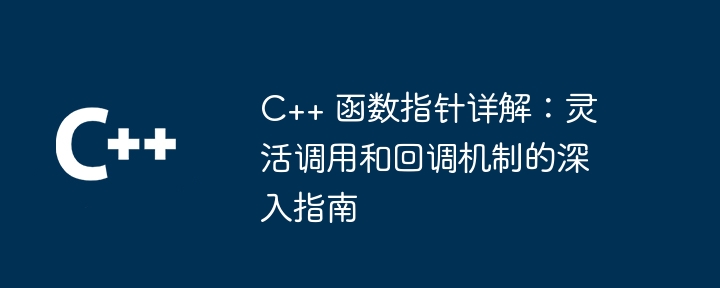
Detailed explanation of function pointers: Function pointers allow the function address to be stored in a variable to implement dynamic calling and callback mechanisms of functions. Function pointer syntax: returnType (*functionPointerName)(parameterList); To assign a function address to a function pointer, use the & operator. To call a function pointer, just call it like a normal function. Function pointers enable flexible calling and dynamically call different functions as needed. Function pointers can also be used in callback mechanisms to call functions when specific events occur.

Function pointers are a powerful C feature , allows the address of a function to be stored in a variable. This provides many benefits, including flexible calling of functions and the implementation of callback mechanisms.
The syntax for a function pointer is as follows:
returnType (*functionPointerName)(parameterList);
For example, the following is the declaration of a function pointer that will return an integer and accept an integer argument:
int (*funcPtr)(int);
To assign the address of a function to a function pointer, use the "&" operator:
funcPtr = &functionName;
Now, the funcPtr variable points to functionName function.
To call a function pointer, just use it just like calling a normal function:
int result = funcPtr(arg);
Consider the following code:
void printMessage(const char* message) {
cout << message << endl;
}
void printNumber(int number) {
cout << number << endl;
}
int main() {
// 创建指向两个函数的函数指针
void (*printPtr)(const char*);
void (*printNumPtr)(int);
// 赋值函数指针
printPtr = &printMessage;
printNumPtr = &printNumber;
// 根据需要调用函数指针
printPtr("Hello world!");
printNumPtr(42);
return 0;
} In this case, printPtr and printNumPtr allow us the flexibility to call different functions without having to Hardcoded function name.
A callback is a function that is called when a specific event occurs. Function pointers provide an efficient way to implement callbacks.
The following is an example of using a function pointer to implement a callback:
class Button {
public:
typedef void(*CallbackFunction)();
Button(CallbackFunction callback)
: callback(callback) {}
void onClick() {
if (callback) {
callback();
}
}
private:
CallbackFunction callback;
};
void onClickCallback() {
cout << "Button clicked!" << endl;
}
int main() {
Button button(onClickCallback);
button.onClick();
return 0;
}Here, the Button class has a callback function that is called when the button is clicked. In our example, onClickCallback is the callback function. When the button is clicked, it prints a message in the console.
The above is the detailed content of C++ Function Pointers Explained: An In-Depth Guide to Flexible Calling and Callback Mechanisms. For more information, please follow other related articles on the PHP Chinese website!
 The difference between typedef and define
The difference between typedef and define
 Usage of typedef in c language
Usage of typedef in c language
 What are the differences between c++ and c language
What are the differences between c++ and c language
 Recommended learning order for c++ and python
Recommended learning order for c++ and python
 Cost-effectiveness analysis of learning python and c++
Cost-effectiveness analysis of learning python and c++
 Is c language the same as c++?
Is c language the same as c++?
 Which is better to learn first, c language or c++?
Which is better to learn first, c language or c++?
 The difference and connection between c language and c++
The difference and connection between c language and c++




